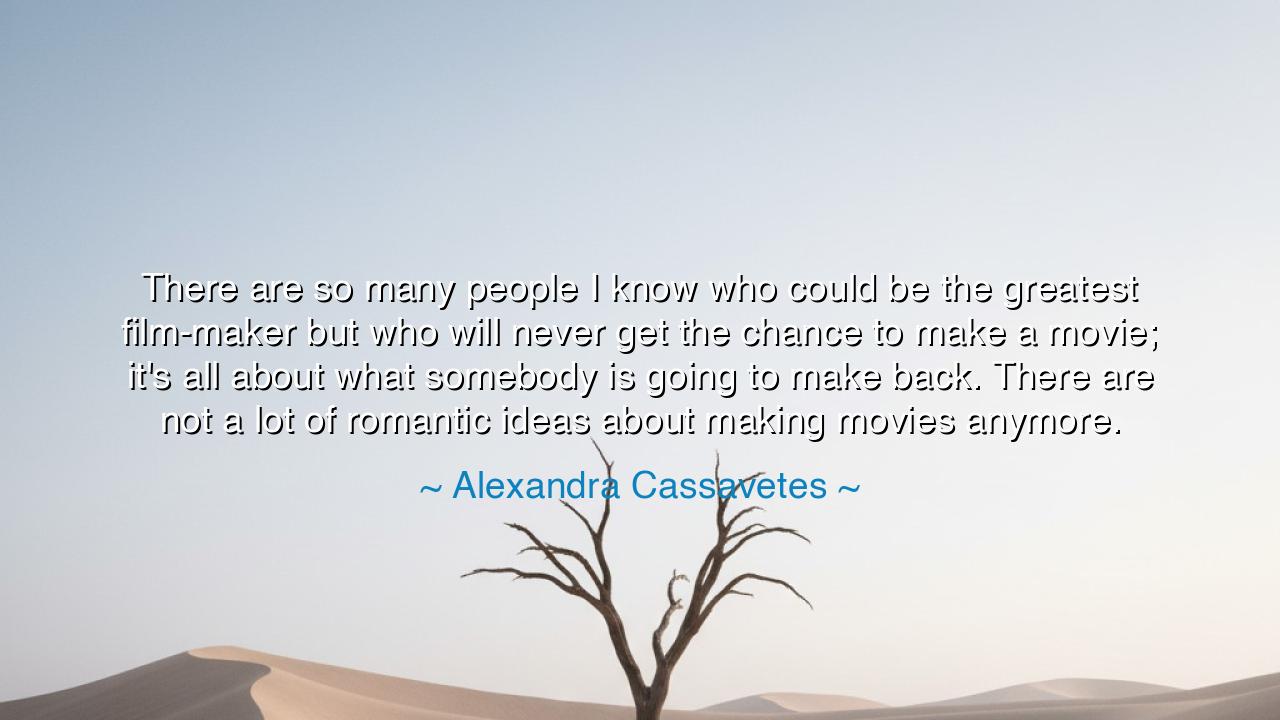
There are so many people I know who could be the greatest
There are so many people I know who could be the greatest film-maker but who will never get the chance to make a movie; it's all about what somebody is going to make back. There are not a lot of romantic ideas about making movies anymore.






"There are so many people I know who could be the greatest film-maker but who will never get the chance to make a movie; it's all about what somebody is going to make back. There are not a lot of romantic ideas about making movies anymore." These words by Alexandra Cassavetes resonate with the heavy weight of modern realities—the clash between artistic ambition and the capitalism that now governs much of the creative world. In a time when commercial interests dominate, film-making, once seen as an art, has been reduced to a transactional endeavor, where the desire to create a masterpiece is often subjugated to the financial bottom line. Cassavetes’ words capture the frustration of those whose talents and dreams are stifled by a world that values profit more than the art itself.
In ancient times, great artists and visionaries—whether philosophers, playwrights, or painters—often faced significant opposition to their work. Yet, their value was not determined by the immediate return on their creations. Take, for example, Socrates, the great philosopher, whose ideas have shaped centuries of thought. He received no monetary reward for his wisdom, nor was he celebrated in his time. His work was driven by an inner passion for truth and knowledge, not by the profit that would come from his ideas. The same could be said of Shakespeare, whose plays were not written with commercial gain in mind but with a deep commitment to exploring the human condition. Their work endured, not because it was profitable in the short term, but because it was driven by a romantic idea—a vision to connect with the souls of others, to explore the unknown, and to create something timeless.
In contrast, Cassavetes speaks to a modern age where profit has taken precedence over purpose. The commercial aspect of film-making has become so deeply ingrained in the industry that the dreams of many talented individuals are crushed under the weight of financial concerns. Film-makers, once considered visionaries, are now often measured by their ability to deliver financial returns. The romantic idea of making films for the sake of art, for the pursuit of an idea or expression, has been replaced by the harsh realities of marketability, audience appeal, and the demands of the studio system. In this environment, many potential visionaries are left without the opportunity to create, as their ideas do not fit the mold of what will make money.
This shift can be likened to the transformation of the Renaissance into the Industrial Revolution. In the age of the Renaissance, art was a reflection of human ingenuity, a means of exploring beauty, complexity, and the divine. Think of Michelangelo and his monumental works—the Sistine Chapel and David—created not for commercial success, but out of a love for the craft and an inner calling to create something immortal. However, as we moved into the Industrial Age, the art of creation became less about self-expression and more about efficiency and profit. Artists became workers, and their creations were often dictated by what the market would bear, not by the inner drive to create something of lasting value. This shift has echoed down through the centuries, and now, even in film, we see a similar trend where the commercial imperative trumps the romantic ideals of creating art.
The rise of independent cinema in the late 20th century, led by figures like John Cassavetes, Alexandra's father, offered a brief moment of resurgence in the romantic idea of film-making. Independent filmmakers often sought to tell stories not for profit, but for the love of the craft, to create something that was authentic, raw, and unfiltered by commercial considerations. However, even within this world, the harsh reality of the market began to encroach, with financiers and distributors demanding a return on their investment. Thus, the romantic ideal of making films for the sake of artistic expression was again compromised by the needs of commerce.
From Cassavetes' words, we draw the important lesson that true creativity, whether in film-making, art, or any other pursuit, must be nurtured by a passion for the work itself, not by the rewards it brings. Passion is the driving force that allows creators to overcome the obstacles that stand in their way. In an age where financial concerns dominate the creative industries, we must remember that the romantic idea of creation—the drive to express our deepest emotions and ideas—cannot be stifled. It is up to each individual to keep that spark alive, to create not for profit, but because the act of creation is part of what makes us human.
In our own lives, let us seek to balance the demands of the practical world with the romantic ideals that fuel our deepest desires. Whether in business, art, or any other field, we must strive to remember the importance of passion, not just profit. Let us create, not for the return on investment, but for the love of the craft itself. Let the romantic vision drive our efforts, knowing that, in the end, it is our dedication to the pursuit of something meaningful that will leave a lasting legacy. In the face of the modern world’s demands, we must be brave enough to follow our hearts, to create for the sake of creation, and to ensure that the romantic dream of making something beautiful and enduring never fades.






AAdministratorAdministrator
Welcome, honored guests. Please leave a comment, we will respond soon